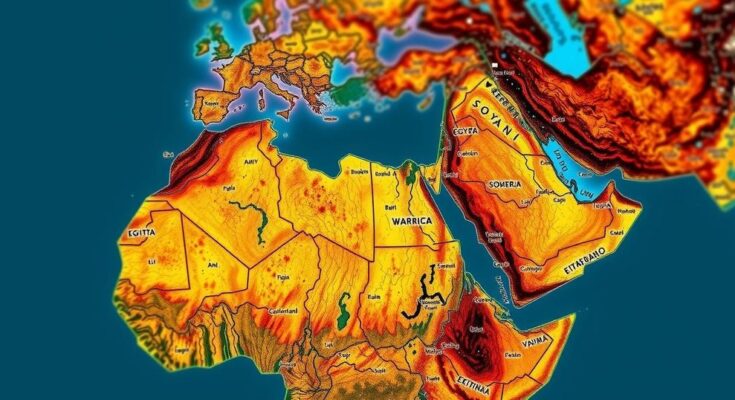The summit of Egypt, Eritrea, and Somalia marks a significant shift in the Horn of Africa’s geopolitics, primarily aimed at addressing Ethiopia’s rising influence and shared regional security concerns. Leaders emphasized cooperation while underlying tensions over issues such as the Grand Ethiopian Renaissance Dam and military alliances threaten to destabilize the area. Ethiopia is urged to adopt a proactive diplomatic approach to maintain its security in this evolving landscape.
The recent summit involving Egypt, Eritrea, and Somalia marks a significant shift in the geopolitical landscape of the Horn of Africa, a region characterized by enduring instability and competitive interests. Convened in Asmara, Eritrea, the trilateral talks aimed to present a united front in response to regional security concerns, with Ethiopia’s actions looming as a pivotal backdrop. While the official agenda focused on enhancing cooperation and maintaining autonomy, the underlying intent appeared to encircle Ethiopia and address the tensions stemming from its expanding influence. The participating leaders—Isaias Afwerki of Eritrea, Abdel Fattah al-Sisi of Egypt, and Hassan Sheikh Mohamud of Somalia—highlighted the need for territorial integrity and resistance to external interference through their collective statements. Ethiopia’s involvement in the complex geopolitical dynamics is further complicated by its controversial dealings with Somaliland and ongoing disputes with Egypt regarding the Grand Ethiopian Renaissance Dam, seen as an existential threat to Egypt’s water security. The relationship between Somalia and Egypt has strengthened following a military pact signed in August, whereby Egypt has been supplying arms to assist Somalia in combating the al-Shabaab insurgency. This nascent partnership indicates a growing Cairo-Mogadishu alliance, potentially undermining Ethiopia’s influence in the region. The issues of regional water politics continue to drive tensions, particularly in light of Ethiopia’s dam operations, which exacerbate Egypt’s anxieties regarding its vital Nile water supply. Furthermore, Egypt’s military presence in Somalia serves its strategic goal of countering Ethiopia’s power, as does Eritrea’s position, strategically situated near the essential maritime route of Bab el-Mandeb Strait. This summit has wider implications; it suggests a realignment of power in the Horn of Africa, as Egypt, Eritrea, and Somalia form a coalition prioritizing military influence and control vis-à-vis Ethiopia’s growing power. Though the joint statements envision a peaceful resolution, the context implies that Egypt may leverage its relationship with Eritrea to jeopardize Ethiopia’s stability indirectly, potentially increasing security risks in the region. Ethiopia is urged to adopt a proactive diplomatic approach, engaging with both Egypt and Eritrea while also seeking international support, particularly from the United States. Establishing strategic partnerships with neighboring countries, such as Kenya and Sudan, may prove essential for maintaining a balance of power. Furthermore, formulating a management framework for Nile waters could help mitigate escalating tensions, while transparent public diplomacy from Ethiopia could clarify its national intentions. How Ethiopia navigates these emerging alliances will significantly influence its future security and stability in this volatile region.
The Horn of Africa has historically been a tumultuous region, marked by conflicting interests and rivalry between neighboring states. The recent summit involving Egypt, Eritrea, and Somalia reflects a shift towards new alliances in response to rising tensions, particularly regarding Ethiopia’s influence over vital resources such as water from the Nile. Egypt has long viewed Ethiopia’s Grand Ethiopian Renaissance Dam as a direct threat to its water supply, leading to a rivalry where strategic military partnerships are increasingly pivotal. The evolving relationships among these three countries demonstrate an attempt to reshape power dynamics in anticipation of Ethiopia’s increasing regional significance.
In conclusion, the summit among Egypt, Eritrea, and Somalia signifies a critical reconfiguration of alliances in the Horn of Africa, driven by shared concerns over Ethiopia’s growing influence. The escalating tensions over water politics and military partnerships indicate a potential shift in regional stability, with Egypt’s role evolving into a more assertive one. Ethiopia must therefore engage diplomatically within this changing landscape to safeguard its interests and stability, navigating complex alliances while clarifying its position on regional issues. The future of security in the Horn of Africa will be largely determined by how these new dynamics unfold.
Original Source: thehill.com




